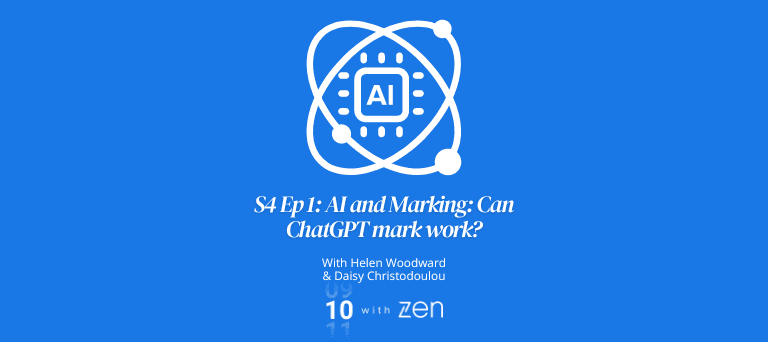21 Sept 2021
Kicking off Series 2 of our podcast with Juliette Alban-Metcalfe
Andrew King
10
min read
A new school term brings a brand new series of the Zen Educate podcast 10 with Zen!
For Series 2, Episode 1, we wanted to explore leadership. How does empathy relate to leading a team? What is Engaging Leadership? Are leaders born or made? Helen sat down with Juliette-Metcalfe, CEO of Real World Group for well-researched insights on all these questions and more.
You can listen to the episode in full above, and we’ve provided a transcript below!
Helen Woodward: Hello, and welcome to 10 with Zen. My name’s Helen Woodward, and I’m an advisor at Zen Educate. Today my guest is Juliette Alban-Metcalfe, CEO of the Real World Group. Welcome to 10 with Zen, Juliette!
Juliette Alban-Metcalfe: Thank you Helen.
Helen: Juliette, you’re a chartered Occupational Psychologist, and you have an MSc in Positive Organisational Development from Case Western University. You’re also undertaking a Doctorate at the moment on Leading Remote Teams, and you’re currently on the editorial committee of the International Congress on Leadership, Management and Governance, so we’re really interested to talk with you today. In particular, it would be good to start with: why does engaging leadership matter? What does the research actually tell us?
Juliette: Engaging leadership is a model of leadership that has been developed over the last 20 years. Things like the importance of empathy, the importance of concern for individuals, the importance of consulting with people, developing them, distributing power, those kinds of things. The reason why it matters today – it matters more than it ever did before, arguably – is because the pressure on people in an organisation is increasing rapidly. We know that even before the COVID-19 pandemic that there was a real challenge around the pace of change in the world, the fact that turbulence is much more disruptive than it ever was before, the fact that the world is much more interconnected, and so geopolitics and even national politics affect organisations and their people in much greater ways than they used to. And of course, the pace of technological change over the last 10 years has been enormous. So it’s more important than ever that leaders and organisations are proactively working in ways that help to protect people that work with them from the effects of huge turbulence and change, and enable them to stay resilient and to stay well despite all the pressures. For example, we know that one of the major negative factors that comes out of unplanned change, turbulence and uncertainty is stress, or anxiety. We know that before COVID-19, the World Health Organisation were talking about stress as the pandemic of the 21st century. We also know from research that’s been undertaken during the COVID-19 pandemic that people’s sense of stress and pressure and mental health challenges have got worse. Being an engaging leader has always been important as I’ve been describing, but it’s even more important now. People feel, as I’ve said, resilient, because the team has high levels of change readiness, people feel they have social support from their leader and their colleagues. They feel they have a sense of psychological safety because what we need is for people to do things differently in a changed world, and we need to co-create the future in ways that will work for the unique situation in one team vs. another vs. a different department vs. a different organisation. We also need to make sure that, if people are going to be offering their suggestions and innovating and feeling resilient, they need to feel safe to make suggestions without ridicule. So there’s a whole range of different things that leaders need to think about, even more than they did before to ensure their teams are able to perform and stay well.
Helen: OK – so I’m listening very carefully to what you’re saying, because there’s a lot in there, which is really helpful. I want to link two things to my next question in particular: what does this mean in practice for school leaders? I’m particularly interested in two ideas that you talked about, one is readiness for change, and the other is psychological safety. It’d be really great to hear from you what those things are, and how school leaders can make sure they are very present in their school.
Juliette: One of the things we need to understand about change is that there is this pervading myth that people resist change. In actual fact, it is just a myth. People do resist change when it’s handled badly, and unfortunately it seems that most change isn’t handled optimally in most organisations. So we’re talking about planned change rather than unplanned change. It’s important to distinguish between the two. The COVID-19 pandemic is unplanned change. First of all, it’s about making sure that the change is run as effectively as possible. It’s things like keeping people informed. So, at the moment, there’s likely to still be a huge amount of uncertainty in schools about ‘what next?’ What’s important is that the leaders in the school, the more senior they are, are open as much as they can be about what they know and what they don’t know. Because of course what happens during change is that we have a sense of things coming, and as human beings we want to be able to predict the future, and so we imagine what we think will be next. The way our human brains work, as people that have looked at neuroscience will know, tend to look more at threats than opportunities, so it’s important when people have a sense that change is coming that those people in the senior roles have been informed as to what is definitely happening, what isn’t definitely happening, and what the unknowns are that even they’re not sure about yet, to avoid people making stuff up! The next thing that’s really critical is to get people involved with building a shared vision of what the change will look like. It’s also really important that they’re involved in building the vision of how we’re going to get there, too! That’s just as important. Leaders need to be creating the conditions that people will be more committed to the organisation, more committed to their job, more committed to their leader, and then able to deal with change as it emerges.
Helen: OK, that’s really helpful, and I’m very interested in the ideas of how uncertainty does unsettle us, and how that can raise our anxiety, but actually feeling that we’re contributing to what a future might look like can bring that sense of efficacy and agency.
Juliette: Absolutely. One of the big areas where leaders can help unwittingly destroy people’s sense of meaning or commitment to their jobs by not being clear about non-negotiables. Not being clear about expectations, but also not being clear about what the parameters are for what we can do going forward and what we can’t do going forward. As uncomfortable as that might be, leaders need to grapple with that, as it can make everything else come undone.
Helen: Yes – there’s a point about being really clear in a conversation; when are we talking about ideas and when are we moving towards commitment and agreement, and being really clear about which stage of the conversation we’re at. When we’re working with just ideas that we’re exploring, and when we’re going to move towards decision-making and agreement and commitment. One of the things I think is really interesting is the point about ‘are leaders born or made?’ Are there some people that are just innately better at leadership, and if you find yourself in a leadership position that you didn’t plan for – and this does happen – can you learn it? What are the options?
Juliette: I really feel very strongly that leaders are made rather than born. The way leadership seems to emerge is either through role modelling, or through being shown and able to explore it a different way than you might naturally develop as a leader. So many people have naturally had an engaging leader, someone who cares about their employees, someone who is interested in their opinions, who does all the great things I’ve been talking about earlier. And so those people might naturally develop into another engaging leader. But equally, you can have somebody whose role models were either transactional or autocratic, perhaps even toxic at the other extreme. Those people might initially adopt those ideas because they don’t know any different. So people can go awry for various different reasons, through no fault of their own. What you see all the time is ‘aha’ moments of our leadership teams or individuals who want to have a more positive impact on their people who, by reflecting on how they are perceived by other people in their system, can really start to make a change to their behaviour. What we know is either at a cultural level, if you do a culture survey, or at an individual level, if you look at data from ‘time 1’ to ‘time 2’, you do see a shift in perceptions quite significantly over time which suggests that leadership can change, and therefore that leaders are not stuck with how they are.
Helen: OK, so there is hope for all of us, importantly!
Juliette: Absolutely, absolutely. There definitely is. People who want to be a better leader absolutely can be. If people just gather feedback, if they just have the opportunity to, perhaps with the support of a coach, in one way or the other, to actually ask other people ‘how do you perceive my leadership? What impact does it have on you? What could I do differently?’ Just those simple conversations can make a huge difference to a leader’s effectiveness.
Helen: That’s the nub of it, isn’t it really? ‘How does my behaviour as a leader impact on the people around me?’ That’s the kind of crucial question that all of us need to have good feedback on – by which I mean specific feedback on – so we can understand where we’re doing well and where we need to give more time and attention to develop. Thank you so much, Juliette, for being our guest today. It’s been lovely to listen to you and talk with you today.
Juliette: A pleasure, Helen! Thank you ever so much for inviting me.
We’d like to thank Juliette again for her time and insight. To make sure you don’t miss out on future 10 with Zen podcasts, give us a follow on Twitter and Instagram.
Follow Real World Group on Twitter
Search blog posts …
Search








